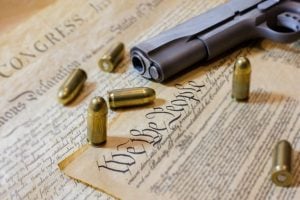(Photo
by
Drew
Angerer/Getty
Images)
We
at
ATL
love
a
good
joke
as
much
as
anyone.
We
had
some
belly
laughs
when
it
emerged
that
Donald
Trump
had
been
taking
legal
advice
from
Judicial
Watch’s
Tom
Fitton,
a
non-lawyer
who
heads
up
a
wingnut
activist
group
founded
by
the
OG
vexatious
litigant
Larry
Klayman
to
sue
Democrats
and
stoke
culture
war.
Because
that
shit
is
funny.
It
is
not,
however,
supposed
to
be
the
basis
of
the
billionaire
former
president’s
legal
strategy.
But
nothing
has
been
right
in
America
for
six
years,
so
…
here
we
are.
The
latest
round
of
briefings
in
the
Mar-a-Lago
documents
dispute
was
unsealed
today,
and
it
put
Fitton’s
legal
arguments
front
and
center.
To
wit,
Judicial
Watch
filed
a
FOIA
request
in
2019
to
gain
access
to
79
hours
of
audiotapes
historian
Taylor
Branch
made
of
then-President
Bill
Clinton
for
his
book
entitled,
“The
Clinton
Tapes:
Wrestling
History
with
the
President.”
When
the
Archives
said
Clinton
had
designated
them
as
personal
records
and
it
didn’t
have
them,
Judicial
Watch
filed
suit
to
force
the
agency
to
designate
the
tapes
as
official
presidential
records
and
seize
them.
US
District
Judge
Amy
Berman
Jackson dismissed
the
case
saying
that,
even
if
that’s
how
FOIA
worked
—
and
it
isn’t
—
the
court
had
no
authority
to
force
the
Archives
to
designate
any
record
as
presidential.
Moreover,
the
agency
probably
had
no
legal
ability
to
seize
the
tapes
anyway,
even
if
it
were
inclined
to
designate
them
as
presidential
records.
From
this,
Fitton
inferred
and
apparently
convinced
Trump,
that
the
president’s
designation
of
a
record
as
personal
cannot
be
questioned
in
any
forum,
and
so
Trump
should
just
tell
the
Archives
and
the
DOJ
to
pound
sand.
“No
one
but
the
president
gets
to
pick
what’s
presidential
records,
no
one
but
the
president
gets
to
pick
what
are
personal
records,”
Fitton
yelled
on
Twitter
in
August.
“And
the
Archivist,
which
is
being
used
as
a
cutout
for
the
anti-Trumpers
running
our
government
here
in
DC,
has
no
authority
to
second-guess
him.”
Well,
it’s
patently
ridiculous.
By
this
logic,
it
would
be
perfectly
legal
for
a
president
to
designate
the
nation’s
nuclear
secrets
as
“personal”
on
his
way
out
the
door.
And
anyway,
the
Presidential
Records
Act
(PRA)
states
very
clearly
that
records
created
in
the
executive
branch
“shall,
to
the
extent
practicable,
be
categorized
as
Presidential
records
or
personal
records
upon
their
creation
or
receipt
and
be
filed
separately.”
So
the
argument
that
Trump
could
simply
shout
“I
DECLARE
PERSONAL”
and
redesignate
vast
troves
of
material
as
non-presidential
years
later
as
he
headed
for
the
exit
is
simply
nonsensical.
But
in
the
event,
the
former
president’s
lawyers
aren’t
even
making
that
argument.
They’re
saying
that,
by
the
mere
act
of
pocketing
them
and
stuffing
them
in
his
pool
locker,
Donald
Trump
implicitly
classified
those
documents
as
personal.
Rather,
Plaintiff
was
authorized
to—and
did
in
fact—designate
the
seized
materials
as
personal
records
while
he
served
as
President.
President
Trump
was
still
serving
his
term
in
office
when
the
documents
at
issue
were
packed,
transported,
and
delivered
to
his
residence
in
Palm
Beach,
Florida.
Thus,
when
he
made
a
designation
decision,
he
was
President
of
the
United
States;
his
decision
to
retain
certain
records
as
personal
is
entitled
to
deference,
and
the
records
in
question
are
thus
presumptively
personal.
And
they’re
relying
on
Tom
Fitton’s
interpretation
of
the
Judicial
Watch
case
to
support
the
contention
that
the
“personal”
designation
by
implication
is
un-reviewable
by
any
court.
“The
Judicial
Watch
decision
provides
an
important
model
for
the
present
case,”
they
argue,
citing
it
as
proof
that
“the
PRA
neither
obligates
nor
permits
the
Archivist
to
make
initial
designation
decisions
or
to
take
control
of
records
that
the
President
has
designated
as
personal
records.”
Indeed,
Trump’s
lawyers
have
consistently
sought
to
portray
this
as
some
kind
of
PRA
enforcement
action,
claiming
that
the
government’s
only
option
to
get
the
documents
back
was
to
file
a
civil
suit.
Which
makes
perfect
sense
if
you
ignore
the
fact
that
a
federal
magistrate
judge
found
probable
cause to
believe
that
Trump
violated
the
Espionage
Act,
obstructed
justice,
and
improperly
handled
government
documents
and
authorized
the
FBI
to
go
seize
all
government
documents
being
stored
at
the
former
president’s
private
club.
Put
simply,
this
is
not,
and
never
has
been,
a
case
about
the
PRA.
Nevertheless,
as
the
privilege
log
the
parties
submitted
over
the
weekend
illustrates,
Trump
is
asserting
his
right
to
transubstantiate
dozens
of
presidential
records
into
personal
documents
simply
by
the
act
of
taking
them
out
of
the
White
House.
And
he’s
doing
it
expressly
citing
the
Judicial
Watch
precedent.
The
government
writes:
In
several
hundred
instances,
Plaintiff
has
asserted
that
records
are
“personal”
with
the
following
explanation:
Basis:
Cover/folders/envelopes/personal
messages/misc.
personal:
consistent
with
the
PRA
and
Judicial
Watch
v.
NARA,
these
are
items
generated
during
the
presidency
that
can
be
possessed
post-presidency
and
effectively
deemed
“personal.”
And
if
Trump
fails
to
persuade
the
court
that
these
documents
became
personal
through
the
act
of
purloining
them,
the
he
argues
in
the
alternative
that
they
are
executive
privileged
and
cannot
be
disclosed
to
the
Justice
Department,
even
though
it
is
a
part
of
the
executive
branch.

“The
Special
Master
should
not
indulge
this
type
of
gamesmanship,”
the
government
scoffs
in
response.
Indeed,
the
government’s
brief
to
Special
Master
Judge
Raymond
Dearie
submitted
today
is
particularly
indignant
about
the
former
president’s
legal
arguments.
The
government
notes
that
there
is
only
one
document
for
which
attorney-client
privilege
is
disputed
—
despite
Judge
Aileen
Cannon’s
hyperventilation
about
the
government
filter
team
being
untrustworthy,
thus
necessitating
a
special
master
review
—
and
121
for
which
Trump
is
making
a
threshold
claim
of
executive
privilege,
rather
than
a
secondary
one
in
case
the
court
refuses
to
allow
him
to
transmogrify
presidential
records
into
personal
ones
via
theft.
Instead,
Trump
has
moved
the
goal
posts
to
pretend
that
criminal
suspects
are
routinely
entitled
to
the
pre-indictment
return
of
all
personal
property,
even
that
which,
as
here,
was
seized
pursuant
to
a
duly
authorized
warrant.
And
that
is
not
a
thing.
In
lieu
of
making
viable
privilege
claims,
Plaintiff
now
asserts
that
the
overwhelming
majority
of
documents—more
than
97%
of
the
total
seized—qualify
as
his
“personal”
records
under
the
PRA.
Even
if
correct
(which
it
is
not),
that
characterization
amounts
to
a
red
herring
in
this
proceeding.
Documents
commingled
or
collectively
stored
with
the
classified
materials
located
at
Plaintiff’s
premises
were
lawfully
seized
by
the
FBI
in
accordance
with
the
terms
of
the
court-authorized
search
warrant
because
of
their
relevance
to
the
government’s
ongoing
investigation.
That
relevance
exists
irrespective
of
whether
they
were
personal
papers
or
government
records.
In
the
absence
of
a
valid
and
substantiated
claim
of
privilege,
all
such
documents
must
now
be
made
available
to
the
investigative
team
Prosecutors
point
out
that
this
is
not
a
PRA
case
brought
by
the
Archives,
but
is
in
fact
a
Justice
Department
investigation
of
real
crimes
for
which
people
routinely
go
to
jail:
The
FBI’s
court-authorized
search
of
Plaintiff’s
premises
was
not
undertaken
on
behalf
of
the
National
Archives
to
ensure
compliance
with
the
PRA.
It
was
undertaken
in
connection
with
an
ongoing
national
security
and
criminal
investigation
into
potential
violations
of
federal
criminal
statutes
prohibiting,
inter
alia,
the
unlawful
retention
of
national
defense
information,
obstruction
of
justice,
and
the
willful
removal
of
government
records.
Nothing
in
the
PRA
preempts
the
application
of
those
criminal
laws
And
as
for
the
legal
advice
Donald
Trump
got
from
Tom
Fitton
and
persuaded
his
supposedly
“normal”
lawyers
to
argue
in
court,
well
…
Plaintiff
asserts
that
a
law
enacted
by
Congress
in
the
wake
of
Watergate
to
preserve
the
public’s
access
to
Presidential
records
actually
allows
a
President
to
(1)
pack
up
and
remove
boxes
full
of
Presidential
records
at
the
end
of
his
term
in
office;
and
(2)
convert
those
Presidential
records
into
“personal”
records
through
that
simple
act
of
removal.
To
state
Plaintiff’s
position
is
to
refute
it
Yes,
we
all
feel
like
we’re
taking
crazy
pills
reading
a
legal
document
which
argues
that
the
act
of
stealing
a
document
implicitly
declassifies
it.
And
Judge
Dearie
has
shown
no
indication
that
he’s
sympathetic
to
the
plaintiff’s
reasoning.
But
Judge
Cannon
is
going
to
get
the
last
word
at
the
trial
court
level,
and,
going
by
her
prior
decisions,
she’s
keeping
several
bottles
of
crazy
pills
in
her
chambers.
So
it’s
anyone’s
guess
what
she’ll
do
with
Judge
Dearie’s
decisions
here.
And
lest
we
forget,
the
Eleventh
Circuit
is
considering
an
expedited
appeal
of
Judge
Cannon’s
special
master
order
which
may
moot
this
whole
process.
But
it
will
not
expunge
these
briefs
from
our
memory
—
because,
not
to
put
too
fine
a
point
on
it,
but
this
stuff
is
fuckbonkers
insane.
Trump
v.
United
States
[Docket
via
Court
Listener]
Liz
Dye
lives
in
Baltimore
where
she
writes
about
law
and
politics.
 Kathryn
Kathryn


 Chris
Chris











